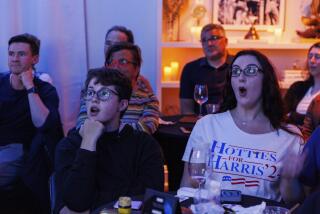Egypt presidential candidates clash in TV debate
- Share via
CAIRO — Egyptians gathered in living rooms and cafes Thursday night to mark another first in their troubled political odyssey toward a new democracy: a televised presidential debate that was as captivating as it was surreal.
The two leading candidates, former Foreign Minister Amr Moussa and Islamist favorite Abdel Moneim Aboul Fotouh, clashed in an exchange that would have been fiction during the 30-year rule of deposed President Hosni Mubarak. The spectacle was a rare moment in a region enthralled by Arab uprisings but largely dominated by autocrats and political uncertainty.
It was also thoroughly Egyptian: Aboul Fotouh was delayed in arriving at the studio by Cairo’s notorious traffic, viewers endured streams of music-drenched ads, and analysts chatted for long stretches. But after the final opening commercials, the focus shifted to how the candidates would bring forth a new political era.
“I never imagined myself living to see the day of a live presidential debate,” said Ashraf Gadallah, a lawyer. “It gives me a positive vibe amid all the gloominess of our political situation.”
Gripped for months by protests and bloodshed, Egypt has tumbled from an inspiring iconic image to a cautionary tale as it seeks to move beyond military rule and Mubarak’s corrupt legacy. The debate was a bit of refreshing theater, reminding Egyptians that the ideals of their revolution, although ever wobbly, are culminating in a May 23 election.
Moussa portrayed himself as an experienced diplomat capable of restoring stability. Aboul Fotouh struck the tone of a moderate Islamist in tune with the ideals of the revolution. Both candidates agreed that the constitution should be guided by sharia, or Islamic law. But Moussa stressed that the rights of Christians and other minorities must be protected and that religion should not influence public policies on education and economics.
“There’s no contradiction between religion and citizenship, or religion and the constitution, or religion and the state,” said Aboul Fotouh, attempting to appease ultraconservative Salafi leaders who recently endorsed him without alienating his more liberal base.
A major difference between the candidates — one that mirrors the nation’s divide — is the unfinished revolt that toppled Mubarak. Moussa attacked Aboul Fotouh, who has attended protests, for sympathizing with demonstrators at the expense of national security. Aboul Fotouh countered by suggesting that Moussa, who served under Mubarak a decade ago, was complicit in the oppression that led to the uprising.
“I wasn’t one of them,” Moussa said. “I left the government 10 years ago.”
The comment was indicative of the early rounds of the debate in which Aboul Fotouh tried to link Moussa to the former regime. Moussa struck back by suggesting that Aboul Fotouh was less liberal than he appeared and would align himself with conservative Islamist elements if he became president.
Absent for the night was Mohamed Morsi, the Muslim Brotherhood candidate who has fallen to third or fourth in the race. The Brotherhood, which controls nearly 50% of parliament, was left out of the spotlight after debate organizers decided only the top two of 13 presidential candidates would be invited.
Moussa and Aboul Fotouh stood side by side on the podium with a narrow space between them. Both were dressed in dark suits. Aboul Fotouh often stared directly at Moussa, who appeared more relaxed. Their exchanges were heated at times, a fascination for millions of viewers who for decades were accustomed to the monotone and unchallenged Mubarak.
A crowd of about 100, many of whom arrived two hours early to get a seat, watched the debate on a big-screen TV in the Mr. Omar Cafe. Cheers of “Allah!” and “Yes!” rose from tables when a candidate went on the offensive. It had the air of a soccer match; men kept score and listened intently.
“Moussa today is showing that he is a real statesman who has what it takes to rebuild Egypt,” said Ahmed Rafik, an engineer, sitting in a cloud of shisha smoke. “He is not religiously affiliated to anyone and wants the best for the nation.... He would answer to no one and is a man of politics and his own mind.”
He added, “I am also very glad that Moussa asked Aboul Fotouh about his ties with Islamists and Salafis because I also do believe that Aboul Fotouh, if elected as a president, will be offering many compromises to Islamic forces as a payback for their endorsement.”
Not far away, Maged Amin, a business graduate, rooted for Aboul Fotouh.
“He is speaking the language of the revolution and we can sense that from the very first moment,” Amin said. “Moussa doesn’t even believe in the revolution.... Moussa still wants to build on what was done under Mubarak. He keeps distancing himself from Mubarak despite being a trusted ally for 10 years.”
He paused.
“I know that Moussa looks calmer,” he said. “That’s because he’s been talking and talking for years without actually doing anything. Aboul Fotouh has a revolutionary mentality. He’s less on talk and more acts and strong beliefs.”
Hassan is a news assistant in The Times’ Cairo bureau.
More to Read
Sign up for Essential California
The most important California stories and recommendations in your inbox every morning.
You may occasionally receive promotional content from the Los Angeles Times.











